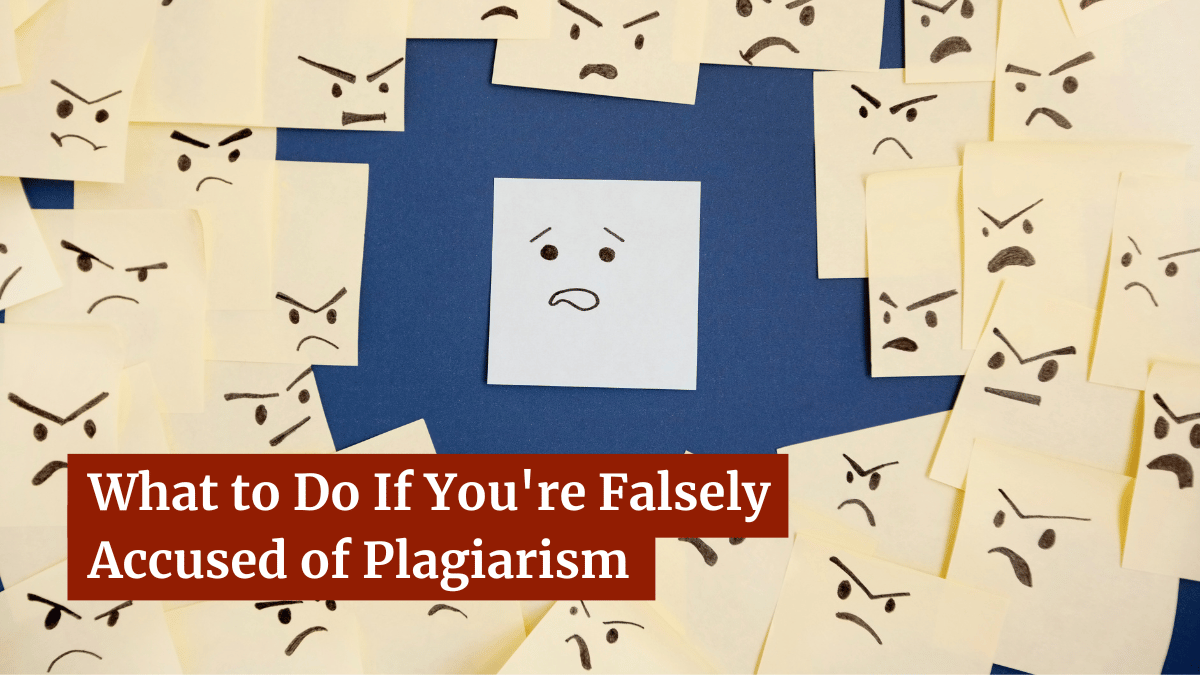What to Do if You’re Falsely Accused of Plagiarism

Yesterday, we took a look at some of the most common mistakes that people make when investigating plagiarism.
However, that raises the question: What should you do if you’re on the other side of that coin?
Being accused of plagiarism is, in a word, terrifying. Whether it’s at school or in a work environment, a plagiarism accusation can have life-altering consequences. That makes it very difficult to think logically, and it’s incredibly easy to do or say things that can actually harm your case or can even get you in more trouble.
As such, the first and most important thing to do is to pause and to not act impulsively. Even though you do need to act quickly, it’s important to collect your thoughts and make sure that your response is productive.
After that, there are several things you can and should do in response to such an allegation.
This starts with fully understanding what the allegations against you are.
1: Read and Understand the Allegations
The first thing to do is to fully read and understand the allegations. This means both examining the allegations themselves and the evidence that was used to reach those conclusions.
If you were not provided the evidence or the full claim, politely request them. It’s nearly impossible to make a full and proper response to a claim of plagiarism without those.
Once you have all that information, take a moment to really examine it. Specifically, you need to understand the following things:
- What they Say Was Plagiarized?: Which work(s) do they believe were plagiarized, and what portions of them?
- Why Do They Feel it Was a Plagiarism?: Is this a case of missing quotation marks? Was the source not cited at all? Or was it a case of alleged contract cheating, either with human authors or generative AIs?
- What Are the Alleged Sources?: What are the sources you’re alleged to have plagiarized from, and are they cited anywhere in the paper?
Ideally, you should do this as close as possible to when you wrote the paper. That way, your memory is as fresh as it can be.
The main question you need to ask yourself is if it’s possible you actually did commit plagiarism? This includes mistakes made in the writing process and misunderstandings about the citation requirements.
If you did commit plagiarism, being honest and transparent is probably your best approach. Private disciplinary processes are not courts of law. The standards of evidence and equity in proceedings are different not just from courts of law, but from institution to institution.
Generally, if you did commit plagiarism, your best bet is to be honest and transparent. Explain what you did and why, and seek a resolution that is as favorable for you as possible.
2: Gather Your Evidence
If, after a thorough examination of the provided documents, you still don’t believe you plagiarized, it’s time to gather your evidence.
Most word processors, including both Google Docs and Microsoft World, automatically create a version history of every document created with them. While these version histories aren’t perfect, they can help show how a document is written.
For example, it can show if large amounts of text have been pasted in at once. Or it can show that sentences were written one at a time, as is normal when someone is typing and not pasting.
These versions don’t always capture everything, but they often capture enough to at least determine how a document was written. For example, an AI-generated paper would likely show up as a copy and pasted unless the plagiarist retyped the entire document.
Other evidence to make sure you have would include any notes or outlines that you have for the project, any information or correspondence you have about the assignment, and any similar assignments that you’ve completed in the past without issue. They all could be very helpful, especially if they have date and timestamps.
Also, if you communicated with anyone else about the assignment, make sure that they are aware of the allegations so that they can preserve any documentation they might have.
3: Make Your Case
Often times, false allegations of plagiarism are simply mistakes. As we discussed in the previous post, there are many easy errors one can make when performing a plagiarism analysis, and it is likely that your defense hinge on one of those errors.
By this point, you should have a good handle on what the misunderstanding or difference of opinion is, and you should speak directly to that.
Write a concise and professional email detailing your side of the story. Provide all the evidence that you gathered. Be careful to do all of this in writing. Not only because it’s how you can best provide the evidence, but to keep everything on the record.
If the allegations are just from your teacher or editor, provide them with this information. If the matter has already been handed off to a disciplinary committee, then also send that information to them.
4: Follow the Process
Hopefully, if the allegations truly are in error, they will be dropped quickly and there won’t be much of a process. But, if that doesn’t happen, it’s important that you stay with it.
Carefully read all correspondence that you get, make sure to meet all the deadlines put upon you, and to attend all the hearings that you are asked to. Missing deadlines and skipping meetings is a sure-fire way to make things worse for yourself.
Likewise, it’s important that you read and understand what that process is so that you know what rights you have under the system and can ensure that you aren’t shortchanged, either intentionally or unintentionally.
Unfortunately, these processes are not courts of law and nor are they meant to be. Don’t expect to have the same rights and presumption of innocence that you would have in a criminal court. These tribunals are often unfair, even when the process unfolds as intended.
Still, there’s nothing gained by abandoning it or ignoring it.
Should You Have a Lawyer?
To be clear, I am not a lawyer and cannot give legal advice. However, I do have a great deal of experience working in disciplinary hearings and can say that lawyers are limited in what they can and cannot do in such cases.
The biggest issue is that, since these aren’t “real” courts, lawyers aren’t usually necessary and can’t provide any real guidance about going through the process.
That said, if you are worried that you are not able to communicate your case well, or you need help gathering and presenting evidence, a lawyer can be very helpful.
Likewise, if the case deals with any external legal issues, such as discrimination or breach of contract, then a lawyer is also likely helpful. In both cases, the earlier they are brought in, the better.
If you have any doubts whether a lawyer can help you, I would suggest getting a consultation. There are even firms that specialize in this kind of work.
Bottom Line
Being accused of plagiarism is an emotional and stressful experience. That is doubly so if you don’t feel you did anything wrong.
However, it’s important not to act out of those emotions and, if at all possible, keep a cool head and present your case strongly.
It’s rare for an instructor or an editor to accuse someone of plagiarism out of malice. Usually, it’s a mistake or a misunderstanding, and the difficult part is figuring out what that misunderstanding is and on whose part it is.
While there will always be some outliers, in general, if you go at this with that in mind, you’ll likely fare much better.
After all, instructors and editors don’t make these allegations lightly and know that doing so means a great deal more work for them. If they are genuinely mistaken, they will likely be happy to learn so.
So keep calm, gather all your evidence and make your case. If you truly didn’t plagiarize, and they were genuinely mistaken, that will likely be the end of it.
Want to Reuse or Republish this Content?
If you want to feature this article in your site, classroom or elsewhere, just let us know! We usually grant permission within 24 hours.
